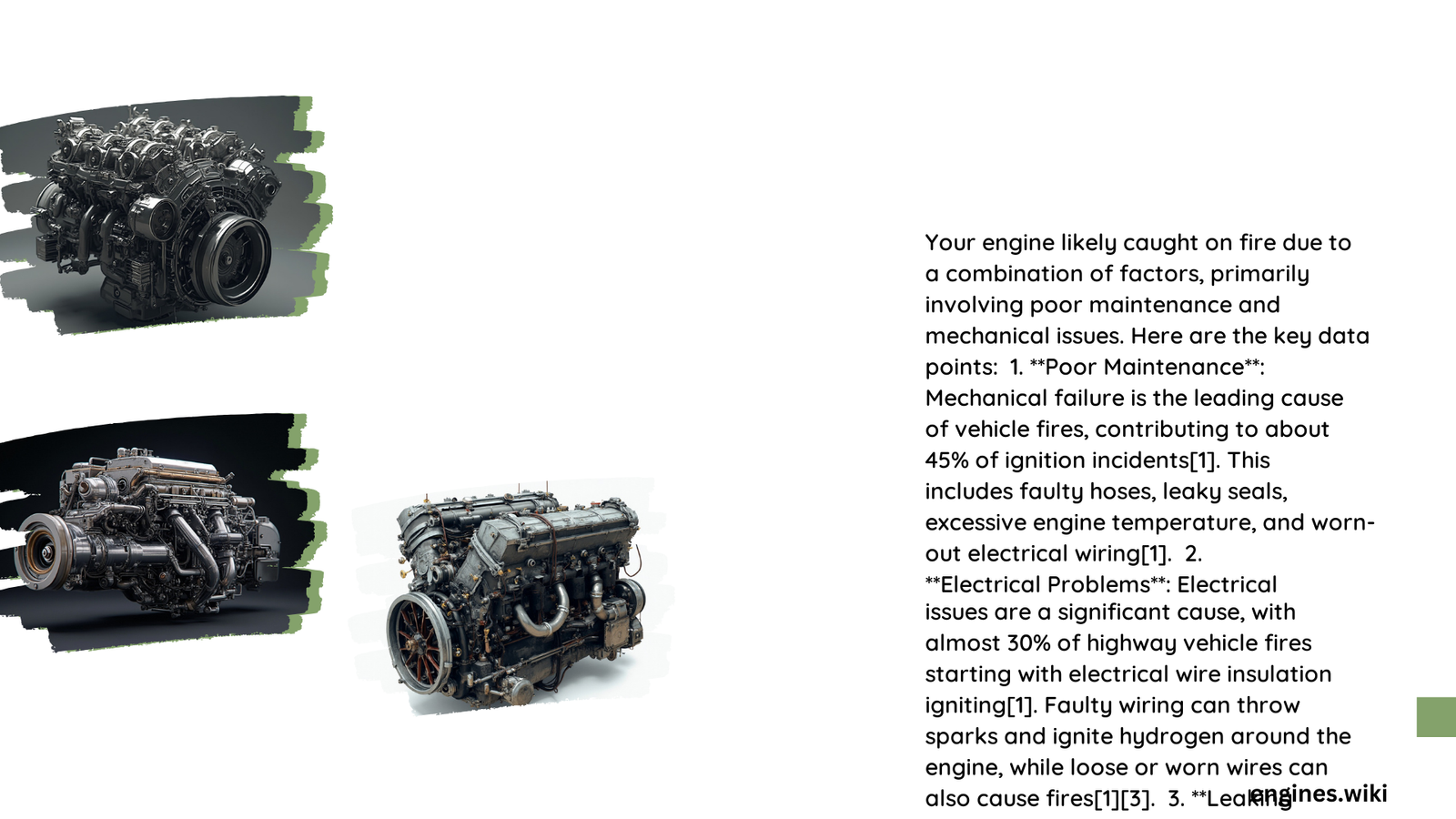An engine fire is a serious and potentially dangerous situation that can occur due to various mechanical, environmental, and electrical factors. Understanding the causes of engine fires is crucial for prevention and quick response. This article explores the common reasons why engines catch fire, including overheating, fuel leaks, and electrical failures, as well as the associated costs and repair timeframes.
What Are the Main Causes of Engine Fires?
Engine fires typically result from three primary factors:
- Overheating due to mechanical and environmental conditions
- Fuel leaks
- Electrical system failures
Let’s delve into each of these causes in detail.
How Does Overheating Lead to Engine Fires?

Overheating is a significant contributor to engine fires. When engine temperatures rise beyond safe levels, it can create conditions conducive to ignition.
What Are the Critical Temperature Thresholds?
- Engine fluids (oil and coolant) can reach dangerous temperatures and leak
- Gasoline can ignite at temperatures above 45°F (7.2°C) with a spark
- Spontaneous ignition of gasoline occurs at 495°F (257.2°C)
What Causes Cooling System Failures?
Common culprits include:
- Malfunctioning cooling system
- Radiator leaks
- Faulty thermostat
- Bad radiator fan
- Clogged hoses
These issues prevent proper heat dissipation, leading to elevated temperatures that can ignite flammable fluids.
How Do Fuel Leaks Contribute to Engine Fires?
Fuel leaks pose a significant risk for engine fires due to the highly flammable nature of gasoline and diesel.
Where Are Common Fuel Leak Locations?
- Fuel tank
- Fuel lines
- Fuel injectors
- Gas tank cap
What Are the Symptoms of a Fuel Leak?
- Smell of gasoline or diesel
- Visible fuel dripping or pooling
- Decreased fuel efficiency
While specific leak rates are not commonly quantified, any noticeable fuel leak is a significant fire hazard, especially if the fuel contacts a spark or hot engine component.
What Electrical System Failures Can Cause Engine Fires?
Electrical system failures are another major cause of engine fires, often resulting from short circuits, damaged wiring, or faulty components.
What Are the Specific Failure Points in Electrical Systems?
- Short Circuits and Damaged Wiring
- Loose or worn wires can create sparks
-
Insulation around electrical wires is often the first point of ignition
-
Faulty Relays and Components
- Malfunctions in relays, sensors, and electronic control units
- Melted relays or large diameter wires carrying high current
What Voltage Levels Are Involved in Vehicle Electrical Systems?
- Most modern vehicles operate on 12V systems
- Some heavier vehicles use 24V systems
- Regardless of voltage, electrical failures can generate sparks and intense heat
What Are the Costs and Timeframes for Diagnosing and Repairing Engine Fire Risks?
Understanding the potential costs and time involved in addressing engine fire risks can help vehicle owners prepare for necessary repairs.
How Much Does It Cost to Fix an Overheating Engine?
| Item | Cost Range |
|---|---|
| Radiator | $200-$500 |
| Thermostat | $50-$200 |
| Water pump | $100-$300 |
| Coolant | $20-$50 |
Labor hours: 2-5 hours for diagnosis and repair
What Are the Expenses for Repairing Fuel Leaks?
| Component | Cost Range |
|---|---|
| Fuel lines | $50-$200 |
| Fuel injectors | $100-$500 |
| Fuel tank repairs/replacement | $200-$1,000 |
Labor hours:
– Diagnosis: 1-3 hours
– Repair: Additional 1-2 hours
How Much Does It Cost to Fix Electrical Failures?
| Item | Cost Range |
|---|---|
| Wiring and connectors | $20-$100 |
| Relays and sensors | $50-$200 |
| Battery | $50-$150 |
Labor hours:
– Diagnosis: 2-5 hours
– Repair: Additional 1-3 hours
How Can I Prevent My Engine from Catching Fire?
To reduce the risk of engine fires, consider the following preventive measures:
- Regular maintenance checks
- Prompt attention to warning lights and unusual smells
- Keeping the engine compartment clean and free of oil residue
- Inspecting wiring and fuel lines for wear or damage
- Using qualified mechanics for repairs and modifications
By understanding the causes of engine fires and taking proactive steps, you can significantly reduce the risk of experiencing this dangerous situation.
What Should I Do If My Engine Catches Fire?
If you encounter an engine fire:
- Safely pull over and turn off the engine
- Evacuate the vehicle immediately
- Call emergency services
- Use a fire extinguisher if available and safe to do so
- Do not open the hood if you suspect an engine fire, as this can fuel the flames with oxygen
Remember, your safety is paramount. Never prioritize saving the vehicle over personal safety.
References:
1. Common Causes of Car Fires, Prevention, and What to Do if Your Car Catches Fire
2. 9 Common Causes of Car Fire
3. What Causes Car Fires?
